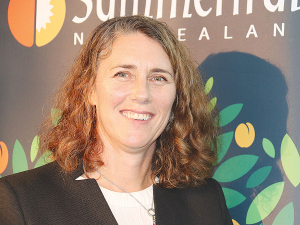New Summerfruit NZ CEO
Dean Smith has been in the role of CEO of Summerfruit NZ for about four months, having succeeded Kate Hellstrom at the end of September.
 Summerfruit NZ’s new chief executive Kate Hellstrom says labour issues will be the key focus for her during the coming 12 months.
Summerfruit NZ’s new chief executive Kate Hellstrom says labour issues will be the key focus for her during the coming 12 months.
Labour issues will be the key focus for Summerfruit NZ's new chief executive Kate Hellstrom during the coming 12 months.
She told Hort News this is the major issue facing the sector and it's one that is not going to back to where it was before the Covid-19 pandemic. Hellstrom says growers want certainty about the availability of labour so they can plan for the coming season.
"The world is going to be a bit different in terms of labour supply and the need for growers to attract and retain labour won't go away," she explains. "The other things coming are climate change settings, water reforms and other government policy settings."
She says for growers to be successful the industry will have to navigate its way through all this.
Hellstrom says what's impressed her in the past year is all the collaborative work that has taken place right across the horticulture sector, resulting in it having a unified voice. She sways they were able to go to government officials and ministers to advocate and explain the challenges that were facing the sector.
"I want to build on that collaboration and the good results it's produced, because it's not just horticulture which is facing these challenges - it's the whole primary sector," Hellstrom told Hort News.
"The challenge of attracting and retaining labour is defining our point of difference. What can we offer employees and workers in terms of incentives and the culture experience that might make them stay and come back next year?"
She says the problems of attracting young people to the industry is just a sign of society evolving as it always has.
She believes the younger generation have different expectations in terms of the experience they expect and conditions of work when they are working on a seasonal basis.
"The other opportunity out of all of this is how we promote ourselves," Hellstrom adds. "It's a great sector to work in and there are many opportunities.
"It's not just picking fruit, there are lots of growth opportunities for people to make a career - including going into management."
Besides dealing with the labour issues facing the sector, Hellstrom's other priority is getting to know people in the industry. She says getting out on orchards and talking to growers and understanding their concerns is important in her early days in the job.
A month ago, Hellstrom attended her first Summerfruit NZ conference and had a chance to get a sense of where growers are at.
"I think people are tired and there is a wearieness from the season," she says. "But they are also really energised by having the opportunity to see each other face-to-face - because there was no conference last year due to Covid."
She says what really came through was the passion people have for their work, despite the challenges.
"They are passionate about what they produce and being part of the food producing industry that feeds NZ and the world, and they just want to get on and produce quality fruit."
As New Zealand marks the United Nations’ International Year of the Woman Farmer 2026 (IYWF 2026), industry leaders are challenging the misconception that women only support farming.
Fonterra’s impending exit from the Australian dairy industry is a major event but the story doesn’t change too much for farmers.
Expect greater collaboration between Massey University’s school of Agriculture and Environment and Ireland’s leading agriculture university, the University College of Dublin (UCD), in the future.
A partnership between Torere Macadamias Ltd and the Riddet Institute aims to unlock value from macadamia nuts while growing the next generation of Māori agribusiness researchers.
A new partnership between Dairy Women’s Network (DWN) and NZAgbiz aims to make evidence-based calf rearing practices accessible to all farm teams.
Despite some trying circumstances recently, the cherry season looks set to emerge on top of things.